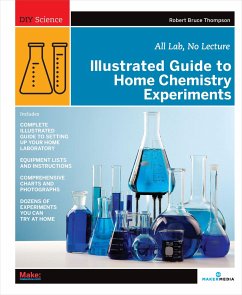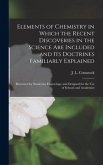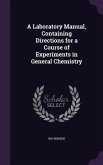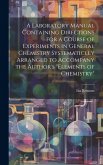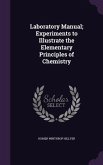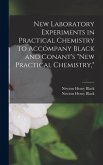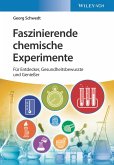For students, DIY hobbyists, and science buffs, who can no longer get real chemistry sets, this one-of-a-kind guide explains how to set up and use a home chemistry lab, with step-by-step instructions for conducting experiments in basic chemistry -- not just to make pretty colors and stinky smells, but to learn how to do real lab work:
Purify alcohol by distillation
Produce hydrogen and oxygen gas by electrolysis
Smelt metallic copper from copper ore you make yourself
Analyze the makeup of seawater, bone, and other common substances
Synthesize oil of wintergreen from aspirin and rayon fiber from paper
Perform forensics tests for fingerprints, blood, drugs, and poisons
and much more
From the 1930s through the 1970s, chemistry sets were among the most popular Christmas gifts, selling in the millions. But two decades ago, real chemistry sets began to disappear as manufacturers and retailers became concerned about liability. ,emThe Illustrated Guide to Home Chemistry Experiments steps up to the plate with lessons on how to equip your home chemistry lab, master laboratory skills, and work safely in your lab. The bulk of this book consists of 17 hands-on chapters that include multiple laboratory sessions on the following topics:
Separating Mixtures
Solubility and Solutions
Colligative Properties of Solutions
Introduction to Chemical Reactions & Stoichiometry
Reduction-Oxidation (Redox) Reactions
Acid-Base Chemistry
Chemical Kinetics
Chemical Equilibrium and Le Chatelier's Principle
Gas Chemistry
Thermochemistry and Calorimetry
Electrochemistry
Photochemistry
Colloids and Suspensions
Qualitative Analysis
Quantitative Analysis
Synthesis of Useful Compounds
Forensic Chemistry
With plenty of full-color illustrations and photos, Illustrated Guide to Home Chemistry Experiments offers introductory level sessions suitable for a middle school or first-year high school chemistry laboratory course, and more advanced sessions suitable for students who intend to take the College Board Advanced Placement (AP) Chemistry exam. A student who completes all of the laboratories in this book will have done the equivalent of two full years of high school chemistry lab work or a first-year college general chemistry laboratory course.
This hands-on introduction to real chemistry -- using real equipment, real chemicals, and real quantitative experiments -- is ideal for the many thousands of young people and adults who want to experience the magic of chemistry.
Purify alcohol by distillation
Produce hydrogen and oxygen gas by electrolysis
Smelt metallic copper from copper ore you make yourself
Analyze the makeup of seawater, bone, and other common substances
Synthesize oil of wintergreen from aspirin and rayon fiber from paper
Perform forensics tests for fingerprints, blood, drugs, and poisons
and much more
From the 1930s through the 1970s, chemistry sets were among the most popular Christmas gifts, selling in the millions. But two decades ago, real chemistry sets began to disappear as manufacturers and retailers became concerned about liability. ,emThe Illustrated Guide to Home Chemistry Experiments steps up to the plate with lessons on how to equip your home chemistry lab, master laboratory skills, and work safely in your lab. The bulk of this book consists of 17 hands-on chapters that include multiple laboratory sessions on the following topics:
Separating Mixtures
Solubility and Solutions
Colligative Properties of Solutions
Introduction to Chemical Reactions & Stoichiometry
Reduction-Oxidation (Redox) Reactions
Acid-Base Chemistry
Chemical Kinetics
Chemical Equilibrium and Le Chatelier's Principle
Gas Chemistry
Thermochemistry and Calorimetry
Electrochemistry
Photochemistry
Colloids and Suspensions
Qualitative Analysis
Quantitative Analysis
Synthesis of Useful Compounds
Forensic Chemistry
With plenty of full-color illustrations and photos, Illustrated Guide to Home Chemistry Experiments offers introductory level sessions suitable for a middle school or first-year high school chemistry laboratory course, and more advanced sessions suitable for students who intend to take the College Board Advanced Placement (AP) Chemistry exam. A student who completes all of the laboratories in this book will have done the equivalent of two full years of high school chemistry lab work or a first-year college general chemistry laboratory course.
This hands-on introduction to real chemistry -- using real equipment, real chemicals, and real quantitative experiments -- is ideal for the many thousands of young people and adults who want to experience the magic of chemistry.

